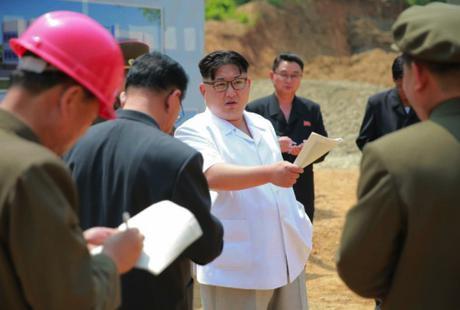
Kim Jong Un issues instructions on the construction of a medical oxygen factory in the suburbs of Pyongyang (Photo: Rodong Sinmun).
Kim Jong Un’s last observed appearance was his inspection of the construction of an eye hospital in Pyongyang
DPRK state media reported on May 30 (Monday) that Kim Jong Un (Kim Cho’ng-u’n) visited the construction of a medical oxygen factory and attended a basketball game.
Attending his visit to the construction of the medical oxygen factory were Ri Man Gon (Workers’ Party of Korea [WPK] Vice Chairman, department director, member of the WPK Political Bureau and member of the Executive Policy Council), Jo Yong Won (deputy director of the WPK Organization Guidance Department) and Ma Won Chun (director of the National Defense Commission [NDC] Design Department).
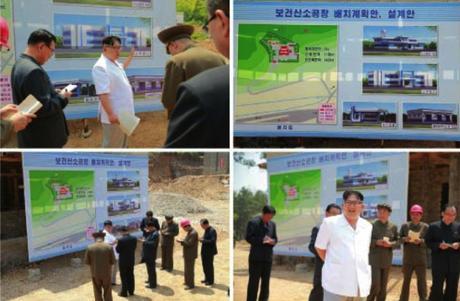
Kim Jong Un tours the construction of a medical oxygen factory (Photos: Rodong Sinmun-KCNA).
According to DPRK state media Jong Un, ever mindful “of firmly protecting and promoting the lives and health of the people and giving fuller play to the advantaged of the socialist healthcare system by bringing about a new turn in healthcare,” initiated the medical oxygen factory’s construction and “chose the site for the factory in a good place in the suburbs of Pyongyang in order to enable all hospitals to use hygienically safe quality oxygen for the medical treatment of the people and solves all the problems arising in its construction.” Jong Un was briefed about the factory’s architectural and construction plans. He toured the site and issued instructions about its development.
Kim Jong Un noted that “oxygen for a medical purpose in use by the field of healthcare requires high hygienic safety unlike industrial oxygen being used by the factories and enterprises” and underscored “the need to build the medical oxygen factory at the highest level to mass-produce high quality oxygen for the hospitals.” He stressed that there is a “need to automate all the production processes including oxygen separating station, liquid and gas oxygen filling stations and put the combined control system necessary for factory management and operation on the highest level and prepare a sufficient quantity of oxygen cylinders of different capacities for diverse purposes.”
He said that “all the buildings of the factory should be built in such a way as to ensure that they keep good harmony with natural environment around it and they look hygienically and culturally neat and tidy and the oxygen supply station should be constructed well so that the hospitals in Pyongyang may receive medical oxygen without any inconvenience.” Jong Un underlined the “need to build modern medical oxygen production bases like the above-said factory in different parts of the country so as to sufficiently provide medical oxygen to all the hospitals across the country” and “took benevolent measures to this end.” He said that “unstinted investment should be made in the field of public health to let the people have benefits of healthcare under our best socialist healthcare system where the party and the state are fully responsible for lives and health of the people…this work also is important for defending socialism.”
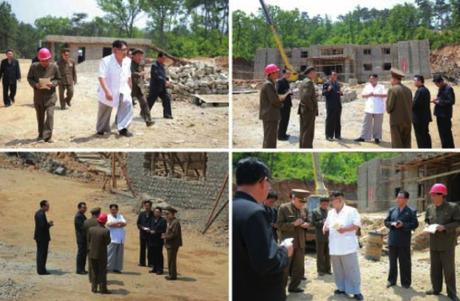
Kim Jong Un tours the construction site of a medical oxygen factory (Photos: Rodong Sinmun-KCNA).
Kim Jong Un noted that all the “service personnel and people of the country would launch the 200-day campaign of loyalty to make a breakthrough toward implementing the five-year strategy for the state economic development set forth at the Seventh Congress of the WPK” and he expressed his “expectation and belief that the builders would further intensify the drive for creating the Mallima speed in the construction of the factory and thus successfully complete ’til September 9, the founding anniversary of the DPRK.”
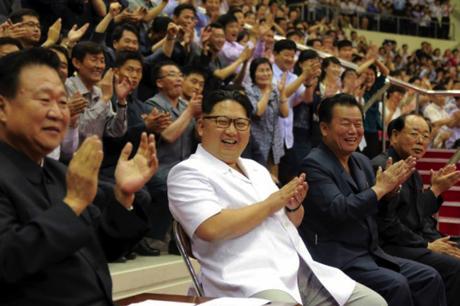
Kim Jong Un watches a men’s basketball game between the Sobaeksu and Chinese Olympic Teams. Also in attendance are WPK Vice Chairman and State Physical Culture and Sports Commission Chairman Choe Ryong Hae (left), WPK Vice Chairman O Su Yong (second right) and Minister of Physical Culture and Sports Ri Jong Mu (right) (Photo: Rodong Sinmun).
Kim Jong Un later watches a men’s basketball game between the Sobaeksu Team and the Chinese Olympic Team. Attending the game with him were Choe Ryong Hae (WPK Vice Chairman, WPK Political Bureau Presidium (standing committee) Member and chairman of the State Physical Culture and Sports Commission), O Su Yong (WPK Vice Chairman, WPK Political Bureau Member and Executive Policy Council Member), Ri Il Hwan (Director of the WPK Workers’ and Social Organizations’ Department), Kim Yo Jong (deputy director of the WPK Propaganda and Agitation Department and Jong Un’s sister), Kim Song Nam (deputy director of the WPK International Affairs Department), Jo Yong Won (deputy director of the WPK Organization Guidance Department), Ri Jong Mu (Minister of Physical Culture and Sports), DPRK athletes, students and schoolchildren and Pyongyang citizens.
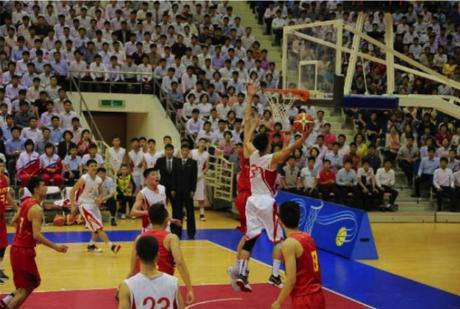
A member of the Sobaeksu Team attempts a layup during a game between the Sobaeksu and Chinese Olympic Teams (Photo: Rodong Sinmun).
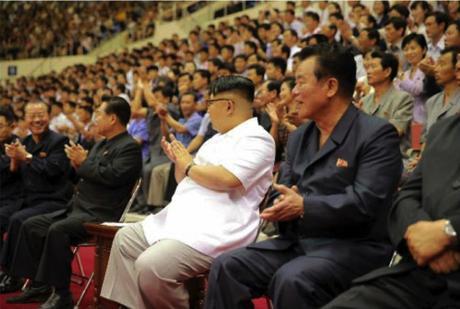
Kim Jong Un and senior WPK officials watch a men’s basketball game between the Sobaeksu and Chinese Olympic Team (Photo: Rodong Sinmun).
The Sobaeksu Team beat the Chinese team 82-73 and Jong Un expressed “great satisfaction over the successful game they played with deep friendship, displaying admirable technique.
Filed under: Central Committee, Choe Ryong Hae, Comprehensive Affairs, DPRK basketball, DPRK Cabinet, DPRK External Relations, DPRK Sports, DPRK-China Relations, Executive Policy Bureau, Guard Command, Information Section, Jo Yong Won, Kim Chong-un inspections, Kim Family, Kim Jong Un Visits, Kim Jong-un, Kim Song Nam (IAD), Kim Yo Jong, KJI Personal Secretariat, KJI-Ko Yong Hui Family, Korean People's Internal Security Forces, Korean Workers' Party (KWP), kpif, local people's committees, Ma Wo'n-ch'un (AD), Machine Building Industry Department, ministry of people's security, Ministry of Physical Culture and Sports, Ministry of State Security, National Defense Commission (NDC), North Korean press, Notification, O Su Yong, Organization and Guidance Department, Political Bureau, Provinicial People's Committee, Public Events, Pyongyang City People's Committee, Pyongyang Defense Command, Pyongyang WPK Committee, Ri Il Hwan, Ri Jong Mu (Physical Culture and Sports Minister), Ri Man Gon (N. P'yo'ngan WPK PC), Sobaeksu Sports Group, State Physical Culture and Sports Commission, State Security Department, Workers' and Social Organizations
